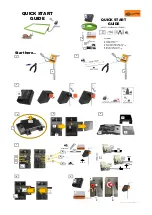
FM Radio Essentials
www.kitronik.co.uk/2135
Solder the Integrated Circuit (IC) holder into IC3. When putting this into the board, be sure to get it
the right way around. The notch on the IC holder should line up with the notch on the lines marked
on the PCB. Once this has been done insert the 8 pin IC into this socket, making sure that the notch
on the device matches the notch on the IC holder.
Now solder in the four electrolytic capacitors. The capacitors have text printed on the side that indicates their value.
The capacitors are placed as follows.
PCB Ref
Value
C21
100
F
C23
220
F
C17 and C22
470
F
Make sure that the capacitors are the correct way around. The capacitors have a - sign marked on them, which
should match the same sign on the PCB.
Solder the two potentiometers into the PCB. Each potentiometer has a different value so they have
to be put in the correct place. If you look at the potentiometers, you will see they are labelled with
their value. The shaft of the potentiometer should point away from the PCB.
PCB Ref
Value
R1
10K
R5
100K
Solder the PP3 battery clip to the terminals labelled Power In . Connect the red wire to + and the
black wire to - after feeding it through the strain relief hole.
Solder the length of single core wire to the terminal labelled Antenna . You will first have to strip off a piece of the
insulation to expose a short length of the wire s core. Before doing this, make sure that you feed it through the strain
relief hole. Once soldered, measure 750mm of wire from the point where the wire is soldered and cut any remainder
off (this will make sure that the antenna is the right length to pick up the correct radio frequencies for the radio).
SOLER THE IC HOLDER
4
SOLER THE ELECTROLYTIC CAPACITORS
5
SOLER THE POTENTIOMETERS
6
Value
ATTACH THE BATTERY CLIP
7
CONNECT THE WIRES
8


























